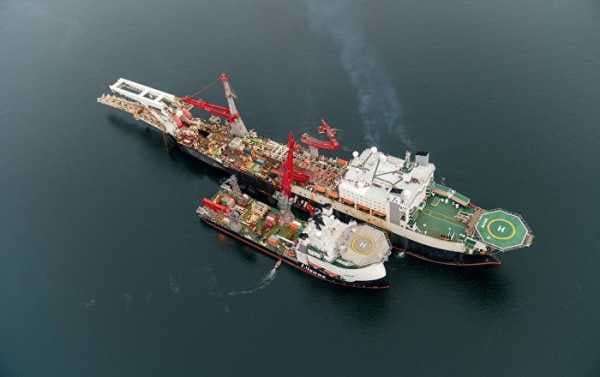
Last year, Denmark made amendments to the country’s legislation allowing the government to reject the construction of pipelines in Danish territorial waters for security reasons. Denmark remains the only country which has yet to give its go-ahead for the Nord Stream project.
There are two main risks for the implementation of the Nord Stream 2 project, pertaining to possible US sanctions and Denmark’s go-ahead for the pipeline’s construction, according to Rainer Seele, chief executive of the Austrian oil and gas company OMV AG.
“First of all, we are waiting for the last remaining building permit from Denmark. I am convinced that in the EU, all the permits that were obtained will work in accordance with the laws of different [EU] countries. And this also will happen in Denmark,” Seele underscored.
He said that he remains optimistic about the issue, given that Copenhagen gave the green light to the construction of the first Nord Stream project in Danish waters.
“So we have a good chance to get Denmark’s similar approval for Nord Stream 2 next year,” Seele noted.
He said that the second risk pertains to possible Nord Stream 2-related sanctions unilaterally imposed by the US, which is “trying to influence the financing of the project.”
“Let’s wait and see. We don’t know what kind of sanctions will be introduced; sanctions risks exist in many other regions,” Seele pointed out.
He signaled his company’s readiness to continue to add to the construction of the Nord Stream 2 pipeline, saying that “the work is going well” and that 108 kilometers (67 miles) of pipes had already been laid.
All major countries involved in the Nord Stream 2 project, including Russia, Germany, Finland and Sweden, have already issued papers permitting the construction of the pipeline in their waters. Denmark is currently the last state yet to give a green light to the pipeline.
In June, Danish Prime Minister Lars Lokke Rasmussen said that Copenhagen may block or suspend the implementation of the Nord Stream 2 project as it wants to bring the discussion on the project to a pan-European level.
The Russian Energy Ministry, for its part, said that it expected Denmark to give permission for the pipeline’s construction by the end of this year.
In late November 2017, Copenhagen made special amendments to the country’s legislation, empowering the country to reject the construction of pipelines in Danish territorial waters for security reasons related to Denmark, the EU and NATO.
In addition, the US has been putting external pressure on EU states over the Nord Stream 2 project. Washington has repeatedly threatened to impose sanctions under its Countering America’s Adversaries Through Sanctions Act (CAATSA) on entities involved in the project, suggesting that Europeans buy more expensive US LNG instead of Russian pipeline gas.
Nord Stream 2 stipulates the construction of two gas pipelines running from the Russian coast north of St. Petersburg through the Baltic Sea to a hub in northeastern Germany. The pipeline, due to be put into operation in 2019, aims to deliver 55 billion cubic meters of Russian natural gas a year to the European Union across the Baltic Sea to Germany.
The project is a joint venture between Russia’s Gazprom, France’s Engie, Austria’s OMV AG, Royal Dutch Shell, as well as Germany’s Uniper and Wintershall.
Sourse: sputniknews.com






